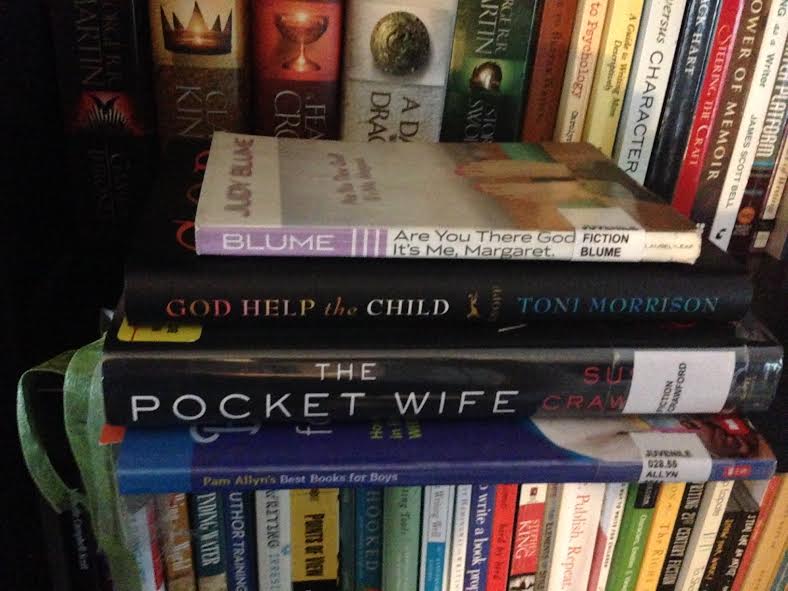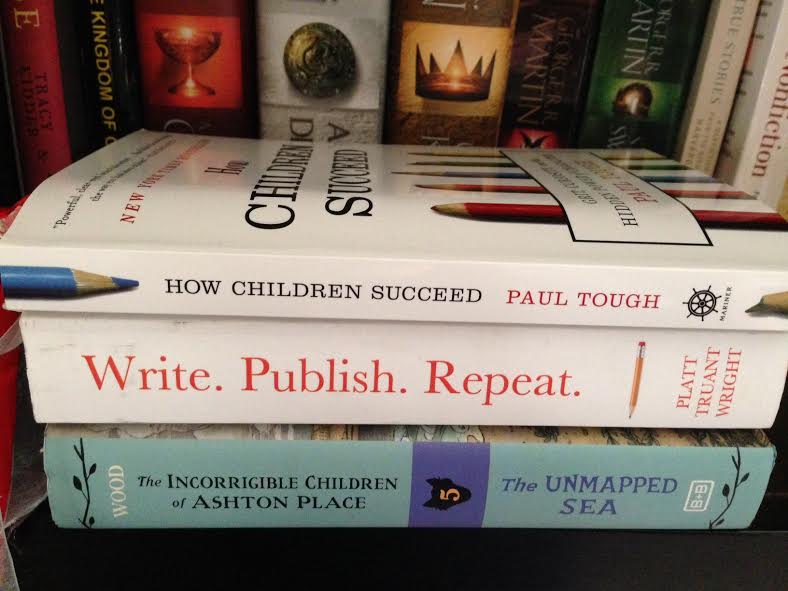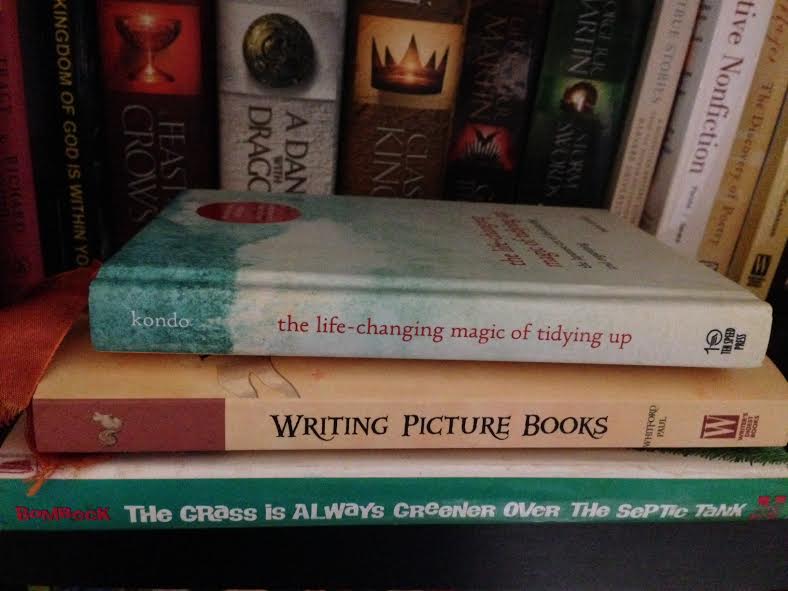
by Rachel Toalson | On My Shelf
On my shelf this week:
Are You There, God? It’s Me, Margaret, by Judy Blume
God Help the Child, by Toni Morrison
The Pocket Wife, by Susan Crawford
Best Books for Boys, by Pam Allyn
This week I’m lost in nostalgia with one of my favorite kid reads (Blume), lost in admiration with the newest from one of my favorite authors (Morrison) (and it’s absolutely brilliant, as usual), lost in mystery with a book club read (Crawford) and lost in learning about boys and what kinds of books they enjoy most (Allyn)—because I plan on writing books boys want to read, so I figured I’d better do a little research on it.
Best quotes so far:
“It’s not so much that I like him as a person God, but as a boy he’s very handsome.”
Judy Blume (She totally gets the adolescent girl.)
“What you do to children matters. And they might never forget.”
Toni Morrison
“So this is what insanity is. Not goofy behavior, but watching a sudden change in the world you used to know.”
Toni Morrison
Read any of these? Tell us what you thought.

by Rachel Toalson | On My Shelf
On my shelf this week:
Two-Part Invention, by Madeleine L’Engle
Everything You Ever Wanted, by Jillian Lauren
Nightbird, by Alice Hoffman
How the World Sees You: Discover Your Highest Value Through the Science of Fascination, by Sally Hogshead
This week I’ve got a beautiful memoir by Madeleine L’Engle, all about her 40-year marriage to Hugh Franklin; a memoir from a mom who “wanted a second act at life;” an intriguing middle grade novel from Alice Hoffman; and an interesting scientific read (because I’m a nerd like that).
Best quotes so far:
“Accepting that we are angry is a healthy and appropriate response as long as we don’t get stuck in it. Acknowledging it is one way of going through it.”
Madeleine L’Engle
“We do not have to understand in order to believe that behind the mystery and the fascination there is love.”
Madeleine L’Engle
“When you stop trying to be all things to all people, you can stop worrying about being liked and start building relationships that allow you to be loved. If you are not creating a negative response from somebody, you’re probably not very fascinating to anybody.”
Sally Hogshead
“Different is better than better. Different doesn’t try to turn you into something else. Different allows you to highlight the singular traits you already have within you. You aren’t necessarily better than your competition. But you are already different.”
Sally Hogshead
Read any of these? Tell us what you thought.

by Rachel Toalson | On My Shelf
On my shelf this week:
Below, by Meg McKinlay
Little Women, by Louisa May Alcott
To Show and to Tell: The Craft of Literary Nonfiction, by Phillip Lopate
The Hero with A Thousand Faces, by Joseph Campbell
This week I’ve got a new middle grade novel, one of my favorite old classics and two (really great) writing books. Lopate is an essay authority who compiled The Art of the Personal Essay, which is also on my list, because I’m always trying to become better at my craft. Campbell is a classic authority on writing, and because I’ve read some of his other works, this one has been on my list for a while. I’m glad I’m finally getting around to it.
Best quotes so far:
“It was funny when you realized that none of the thoughts running through your head had made it into the outside world, that they were yours and yours alone.”
Meg McKinlay
“I am not afraid of storms, for I am learning how to sail my ship.”
Louisa May Alcott
“I’ve got the key to my castle in the air, but whether I can unlock the door remains to be seen.”
Louisa May Alcott
“In the best nonfiction, it seems to me, you’re always made aware that you are being engaged with a supple mind at work. The story line or plot in nonfiction consists of the twists and turns of a thought process working itself out.”
Phillip Lopate
“If consciousness isolates, it also heals and consoles. In my own writing I am trying to say, among other things, ‘This is my consciousness, now don’t feel so guilty about yours. If you have perverse, curmudgeonly, conflicted, antisocial thoughts, know that others have them, too.'”
Phillip Lopate
“Instead of clearing his own heart the zealot tries to clear the world.”
Joseph Campbell
“Not all who hesitate are lost. The psyche has many secrets in reserve. And these are not disclosed unless required.”
Joseph Campbell
Read any of these? Tell us what you thought.

by Rachel Toalson | On My Shelf
On my shelf this week:
The Way to Write for Children: An Introduction to the Craft of Writing Children’s Literature, by Joan Aiken
The Art of Work: A Proven Path to Discovering What You Were Meant To Do, by Jeff Goins
God Help the Child, by Toni Morrison
This week I’m diving into a children’s writing instruction book, just to hone my craft, reading a philosophical figure-out-what-you’re-supposed-to-do book (even though I already know what I was made to do) and reading the newest from one of my favorite authors—and I must say she had me hooked on page 1. Toni Morrison is a master storyteller. I would like to be her when I grow up.
Best quotes so far:
“The first book that a child reads has colossal impact.”
Joan Aiken
“Because children don’t criticize, don’t enjoy criticism, and read wholly for the plot, it is therefore the writer’s duty to keep the narrative in a children’s story as smooth as possible, not to interrupt it with asides to the reader, authorial comments, or any other hindrances.”
Joan Aiken
“A calling is what you have when you look back at your life and make sense of what it’s been trying to teach you all along.”
Jeff Goins
“What it takes to become great at your craft is practice, but not just any practice—the kind that hurts, that stretches and grows you.”
Jeff Goins
“I don’t think many people appreciate silence or realize that it is as close to music as you can get.”
Toni Morrison
“What you do to children matters. And they might never forget.”
Read any of these? Tell us what you thought.

by Rachel Toalson | On My Shelf
On my shelf this week:
How Children Succeed: Grit, Curiosity, and the Hidden Power of Character, by Paul Tough
Write. Publish. Repeat. The No-Luck Required Guide to Self-Publishing Success, by Sean Platt and Johnny B. Truant
The Unmapped Sea (The Incorrigible Children of Ashton Place), by Maryrose Wood
This week I’m reading a fascinating book on how children succeed, written by a journalist who looks at the characteristics that helps kids succeed in spite of stress in their lives. I’m only early in the book, but already it is filled with research and valuable information for parents and educators. The writing book was written by the hosts for the Self Publishing Podcast, who produce an astronomical amount of literature on a weekly basis. I wanted to know their secrets. And the last is the newest book in one of my favorite children’s book series. We’re reading it aloud as a family. The Incorrigible Children of Ashton Place are fantastic read-alouds; Maryrose Wood writes with such personality that the narrator gets to have a voice. My boys love these books.
Best quotes so far:
“What matters most in a child’s development, they say, is not how much information we can stuff into her brain in the first few years. What matters, instead, is whether we are able to help her develop a very different set of qualities, a list that includes persistence, self-control, curiosity, conscientiousness, grit and self-confidence.”
Paul Tough
“Scientists have reached a consensus in the past decade that the key channel through which early adversity causes damage to developing bodies and brains is stress.”
Paul Tough
“It is in early childhood that our brains and bodies are most sensitive to the effects of stress and trauma. But it is in adolescence that the damage that stress inflicts on us can lead to the most serious and long-lasting problems.”
Paul Tough
“Complete product funnels, done correctly, are where most of your money will come from.”
Sean Platt & Johnny B. Truant
“We believe you should write what you want but think you should do so within a framework of intelligent strategy, always considering how to reverse-engineer the market’s expectations after you’re done to get the most bang for your buck.”
Sean Platt & Johnny B. Truant
“When the impossible becomes merely difficult, that’s when you know you’ve won.”
Maryrose Wood
“That is the purpose of museums, of course. One does not go merely to collect facts and souvenirs and picture post cards, but to enlarge one’s notion of all that has been, and all that is, and all that might be. In this way we begin to understand what part each of us was born to play in the marvelous tale of existence.”
Maryrose Wood
Read any of these? Tell us what you thought.

by Rachel Toalson | On My Shelf
On my shelf this week:
The Life-Changing Magic of Tidying Up: The Japanese Art of Decluttering and Organizing, by Marie Kondo
Writing Picture Books: A Hands-on Guide From Story Creation to Publication, by Ann Whitford Paul
The Grass is Always Greener Over the Septic Tank, by Erma Bombeck
On the first one: does she have children? Is she even married? I would love to see this book written for a large family of five or more people. I would love to know it’s possible to have a tidy home with children. Nevertheless, I’ll be trying her technique. This summer we’re pulling everything out and deciding whether or not to keep it, and we’ll be including the children in the process, too. It’s time to reduce. Paul’s book is one I’m reading because I’m working on a couple of children’s manuscripts. It’s been helpful to look at my technique and some of the technical details of writing children’s books. Bombeck’s book is just for fun, because I love her humor.
Best quotes so far:
“Children care deeply. Tap into their strong emotions for your stories.”
Ann Whitford Paul
“Writers don’t need to explain too much. Children are wise enough to figure out what a story is about without tacking on a moral. We’re in the business of writing engaging stories, not teaching lessons. Leave that to education.”
Ann Whitford Paul
“Enduring picture books must be about something bigger than a mere incident. The story problem must explore some large theme or issue. It must have a kernel of truth about life and our world.”
Ann Whitford Paul
“The writer must have an idea, or theme, in the back of her mind that she’s investigating. She must have something that will turn such a set of incidents into a story that stays with the reader long after the book is closed.”
Ann Whitford Paul
Read any of these? Tell us what you thought.







